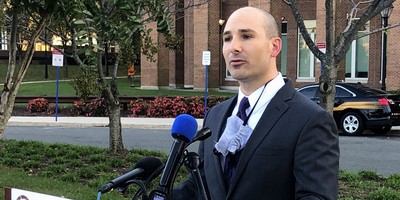Miep Gies, who saved Anne Frank's diary during World War II, died Sunday at the age of 100. Gies was the last living link to the Frank family. She spent her last six decades traveling and talking about her experience during World War II, ensuring that those who read Frank's diary knew that it was genuine and that the Holocaust was real.

Anne Frank was 15 and a prisoner in the Bergen-Belsen concentration camp when she died of typhus in 1945. Her diary, chronicling the two years she hid with her family and another Jewish family from the Nazis, provides an intimate look into the life of an adolescent growing up in hiding and living in fear.
After the war, Gies returned the diary to Anne's father, the only family member to survive. He published the diary a few years later.
"There is nothing special about me. I have never wanted special attention," wrote Gies in the prologue of her memoirs, "Anne Frank Remembered: The Story of the Woman Who Helped to Hide the Frank Family."
"I was only willing to do what was asked of me and what seemed necessary at the time."
Monday, Egypt presented evidence from recently discovered tombs of pyramid workers who had been buried with bread and beer. This discovery reinforces the theory that the workers were not slaves, but free. Though the Hollywood legend is that slaves built the pyramids, Dieter Wildung, a former director of Berlin's Egyptian Museum, believes the workers toiled "out of loyalty to the pharaohs."
The Great Pyramids, more than 4,000 years old, are estimated to have taken 20,000 to 30,000 workers more than 80 years to build. The largest pyramid reaches to a height of 481 feet and is composed of roughly 2.3 million stone blocks, each weighing 2.5 to 15 tons.
Recommended
Possibly the workers understood that their role in building the pyramids would lead to long-term glory for the pharaohs and Egypt. They were part of something bigger than themselves. Thousands of individual workers, over decades, did what they were asked, what they believed was necessary at the time.
What do these two seemingly disparate stories have in common? Big goals, team formation, focus, hard work and perseverance: The same five characteristics identified by Amanda Ripley in her article "What Makes a Great Teacher?" (The Atlantic, January/February 2010)
"First, great teachers tended to set big goals for their students," writes Ripley. "They avidly recruited students and their families into the process; they maintained focus, ensuring that everything they did contributed to student learning; they planned exhaustively and purposefully -- for the next day or the year ahead -- by working backward from the desired outcome; and they worked relentlessly, refusing to surrender to the combined menaces of poverty, bureaucracy and budgetary shortfalls."
In short, they were willing to do what seemed necessary to ensure that their students learned.
We need far more excellent teachers. Students do not learn from school systems, school buildings or even curricula -- students learn from teachers. Everything else should be secondary.
According to the Alliance for Excellent Education, 1.3 million students drop out of school every year. If the top 45 metropolitan areas could cut their estimated 600,000 annual dropouts in half for one year, the alliance estimates, these students would "earn as much as $4.1 billion" more than currently forecasted.
This is an economic problem as well as a social and moral issue.
On Tuesday, in a speech at the National Press Club, American Federation of Teachers President Randi Weingarten proposed new standards for teacher review. "We propose rigorous reviews by trained expert," she stated, "and peer evaluators and principals, based on professional teaching standards, best practices and student achievement." The championing of student achievement into teacher evaluations by the teachers union is big, new and needed.
On Tuesday, I toured a Knowledge is Power Program (KIPP) charter school. The phrase "all of us will learn" was displayed around the school. The students were orderly and focused on learning. The teachers were engaged and involved with their students.
This should be our big goal in education: for all students to learn.
The team needed to help students reach this goal includes conservatives who believe in individual responsibility and liberals who understand that education provides children with a path to a different, more positive future. The goal we should continually focus on is learning. We must continue to work hard, to persevere when all seems hopeless.
Are we willing to do what seems necessary to ensure that all of our children will learn?

























Join the conversation as a VIP Member